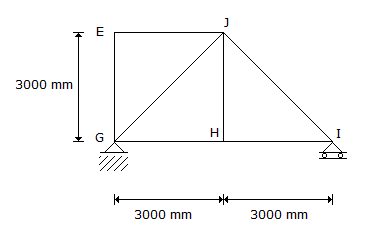Civil Engineering :: GATE Exam Questions
-
In deriving the equation for the hydraulic jump in a rectangular channel in terms of the conjugate depths and the initial Froude number.
-
An important purpose of prime coats is to:
-
A trickling filter is primarily a :
-
A soil having particles of nearly the same size is known as
-
A septic tank is
-
At highway stretches where the required overtaking sight distance cannot be provided, it is necessary to incorporate :
-
The members EJ and IJ of steel truss shown in the figure below are subjected to a temperature rise of 30° C. The coefficient of thermal expansion of steel is 0.000012 per °C per unit length. The displacement (mm) of joint E relative to joint H along the direction HE of the truss, is

-
A-2-hour unit hydrograph can be approximated as trapezoidal as shown in the below figure. The unit hydrograph refers to catchment of area



 Whatsapp
Whatsapp
 Facebook
Facebook

